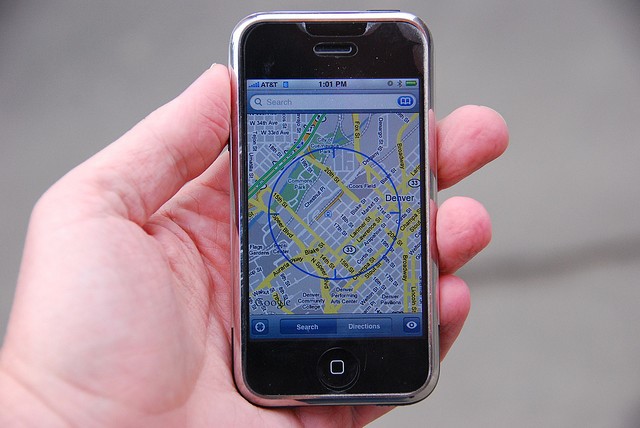By Elizabeth Wang

(Peter Batty/Flickr)
WASHINGTON – One of China’s largest television news stations announced July 13 that Apple’s iPhones should be considered a threat to national security.
China Central Television, or CCTV, claimed that the location tracking on the iPhone could be used to access state secrets. Apple responded the following day by posting a note on their Chinese website, acknowledging the broadcast and dispelling any rumors that the iPhones collect any such data for spying purposes.
Part of the statement reads:
“We appreciate CCTV’s effort to help educate customers on a topic we think is very important. We want to make sure all of our customers in China are clear about what we do and we don’t do when it comes to privacy and your personal data…Apple does not track users’ locations – Apple has never done so and has no plans to ever do so.”
But this isn’t the first time the Chinese central government has had issues with trusting the means of Internet access. For the past month, China has had service issues with Google as well as banning Microsoft’s Windows 8 operating system from being downloaded from new government office computers.
“Some of it is related to them flexing their muscles on American tech companies,” said Steven Bucci, director of the Douglas and Sarah Allison Center for Foreign and National Security Policy at the Heritage Foundation. “I don’t think location service stuff is a national security threat – in any way shape or form.”
Security expert Elizabeth Goitein, on the other hand, said this could actually be a national threat, in an interview she did with the Christian Science Monitor. “Meta data can be used in a way that’s harmful to national security,” said Goitein, co-director of New York University’s Brennan Center for Justice’s Liberty and National Security program.
Some people are referring to this fear as a “Snowden Effect,” following former National Security Agency contractor Edward Snowden’s massive leak of NSA documents in June of last year. China has also been known to be against the popular social-networking site Facebook, following 2009 riots in the Xinjiang autonomous region, freezing access to the website across the nation for fear it was being used by Uighur separatists.
“Even with the Snowden revelation, the American government is not privy to every bit of data that’s on those phones that Apple may be collecting or utilizing for advertising,” Bucci said. China has since partially lifted the ban to a 17 square mile “free-trade zone” in Shanghai, according to the “South China Morning Post.” This was only to smooth out some business deals.
“The Chinese are sometimes prisoners to applying their methodologies to what we do. They’re different,” Bucci said. “The Chinese see all this very differently. They reject the idea that our companies are not connected with the government and telling them to do everything they’re supposed to do.”
But iPhone users are supposed to have full control of opting out of location services by adjusting the settings in each phone.
“And some of it might be some censorship,” Bucci said. “It may be harder for the Chinese government to do their surveillance stuff that they do on their own folks if they’re not using their own technology.”
Regardless, China has taken many precautions to block users from certain websites through the Ministry of Public Security’s Golden Shield project, or the Great Firewall of China, started in 2003.
Now, China is turning toward themselves for reliable technology resources. The future of Apple may be unclear, despite launching a new sales campaign in China earlier this year. That’s especially the case with the competition from the State-run Assets Supervision and Administration Commission, which is urging three other wireless carriers to lower costs, according to an Investors.com article.
“This will not be the last time,” Bucci said. “It definitely won’t be the last time it happens as we sort out how our companies do business with the most gigantic market in the world in a face of government that has a very different view of how that market place should operate as compared to the way we see it.”





